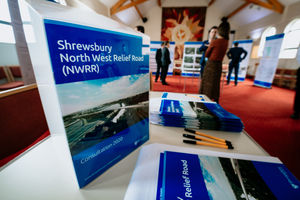Shropshire Council criticised over failing to inform residents about flood plans
Shropshire Council has been criticised for failing to inform homeowners and farmers that their properties and businesses could be affected by new plans for a water retention scheme to be built alongside the Shrewsbury North West Relief Road.

The council’s cabinet agreed at a meeting on Monday to explore the possibility of including a water retaining embankment or dam alongside the relief road project to prevent repeats of the catastrophic flooding of the River Severn seen in February this year.
But two cabinet members, whose wards lie to the north west of Shrewsbury, said it was not acceptable that some residents had found out about the plans – which could see at least one property washed away – via the media.
The council has now promised to fully involve those who could be adversely affected as the scheme progresses.
More:
Councillor Rob Macey, portfolio holder for housing and strategic planning, said: “We recognise something has to be done to help address the situation especially in light of the predicted increases in numbers and severity of weather events that lead to the floods and the predictions for subsequent increases in average river level.
“Many communities within Shropshire have wrestled with the impact of flooding for generations and over time many potential solutions have been put forward.
“We also recognise however any potential measures to address this will impact on some people more than others so we are particularly keen to start a process of engaging people and businesses along the road but especially those negatively affected.”
Councillor Lezley Picton, portfolio holder for leisure and councillor for the Tern division, said people should have been informed of the plans before they were made public.
She said: “I can understand why various parties and residents have felt that this report is geared towards a North West Relief Road solution.
“I just want you to make it abundantly clear that all possible solutions will be looked at and researched, as I believe there are a number of alternative options available.
“We will also need to ensure that all those who are directly affected by any possible scheme are contacted and communicated with as a matter of urgency.”

Councillor Picton said it was “not acceptable” that some people had found out about the project through media reports.
Councillor Ed Potter, portfolio holder for children’s services and councillor for the Loton ward, said: “I want to echo what Councillor Picton has said about communicating with residents, farmers, landowners and tenants who live and work and whose livelihoods rely on the land along the River Severn.
“It’s important that we take them with us on this journey to find a solution to remove thousands of homes and businesses from flooding.”
Backbench councillors had their own questions about the proposed water management scheme, including Councillor David Turner, who represents Much Wenlock.
He said the project was “Shrewsbury-centric” and asked what consideration was being given to flood prevention in communities like his.
Council leader Peter Nutting said a “full assessment” was being prepared addressing the needs of all areas of the county affected by flooding.
Councillor David Vasmer, who represents Underdale in Shrewsbury, asked whether any other options were being considered which could be easier to implement and would be achieved much quicker than the proposed project.
Grants
He further questioned the council’s motives in including the flood management scheme in the relief road plans – which were due to be submitted in July – saying: “Can we assume that, given the likely reduction in traffic following the impact of Covid-19, a convincing business case could not be presented, and that officers have therefore added a flood prevention element so that the council could access capital funding for improved flood risk management?”
It is estimated the cost of the project will be in the region of £100 million, with almost £37 million already secured in government grants to the River Severn Partnership and £40 million earmarked by the Environment Agency.
The report approved by cabinet said the planning application for the North West Relief Road would be submitted as a hybrid application, with road to be approved in full and the embankment element in ‘outline’.
This will allow the embankment to be designed around the water management scheme, if that option is progressed with.
The report said it would not “significantly delay” the construction of the road.
It also said the project could include the development of a “nationally significant” water-based wildlife haven and leisure amenity to the north of Shrewsbury.
But critics have said this will not compensate for the environmental damage the scheme will cause, and have accused the council of adding the water management element into the plans for the relief road to justify its construction.
Kris Welch, from campaign group Road to Ruin Shropshire, said: “The dam is a pretty desperate attempt by Shropshire Council to soften people up for the failing North West Relief Road.
“Nobody wants flooding in Shrewsbury. But when you’re in a climate emergency you don’t deal with floods by wasting millions of pounds and tonnes of CO2 emissions to build a concrete monstrosity on the River Severn.
“You do it by reducing CO2, prioritising less carbon-intensive means of travel and using the money you save to invest in natural flood defences that will benefit the whole county.
“The dam will barely deal with the predicted average river level rise of 85cm by 2050, never mind the more extreme floods we are going to see moving forwards.
“There’s also some irony that the North West Relief Road will cut through internationally-recognised wetlands and lead to more housing developments that are likely to be flooded over the coming years. It’s another example of Shropshire Council failing to think things through before spending our money.”





